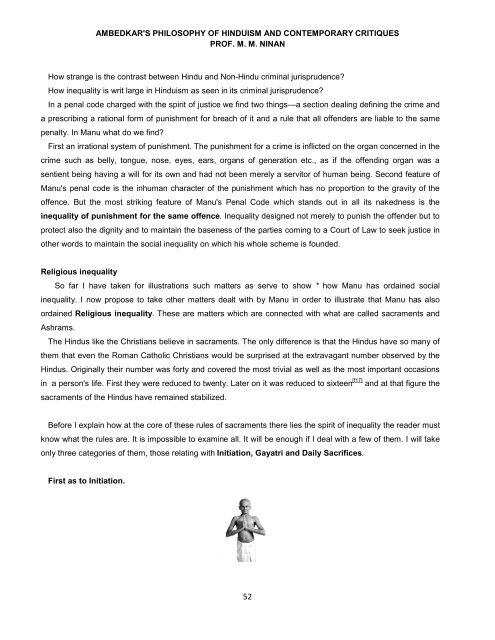Ambedkar-Philosophy of Hinduism
Create successful ePaper yourself
Turn your PDF publications into a flip-book with our unique Google optimized e-Paper software.
AMBEDKAR'S PHILOSOPHY OF HINDUISM AND CONTEMPORARY CRITIQUES<br />
PROF. M. M. NINAN<br />
How strange is the contrast between Hindu and Non-Hindu criminal jurisprudence?<br />
How inequality is writ large in <strong>Hinduism</strong> as seen in its criminal jurisprudence?<br />
In a penal code charged with the spirit <strong>of</strong> justice we find two things—a section dealing defining the crime and<br />
a prescribing a rational form <strong>of</strong> punishment for breach <strong>of</strong> it and a rule that all <strong>of</strong>fenders are liable to the same<br />
penalty. In Manu what do we find?<br />
First an irrational system <strong>of</strong> punishment. The punishment for a crime is inflicted on the organ concerned in the<br />
crime such as belly, tongue, nose, eyes, ears, organs <strong>of</strong> generation etc., as if the <strong>of</strong>fending organ was a<br />
sentient being having a will for its own and had not been merely a servitor <strong>of</strong> human being. Second feature <strong>of</strong><br />
Manu's penal code is the inhuman character <strong>of</strong> the punishment which has no proportion to the gravity <strong>of</strong> the<br />
<strong>of</strong>fence. But the most striking feature <strong>of</strong> Manu's Penal Code which stands out in all its nakedness is the<br />
inequality <strong>of</strong> punishment for the same <strong>of</strong>fence. Inequality designed not merely to punish the <strong>of</strong>fender but to<br />
protect also the dignity and to maintain the baseness <strong>of</strong> the parties coming to a Court <strong>of</strong> Law to seek justice in<br />
other words to maintain the social inequality on which his whole scheme is founded.<br />
Religious inequality<br />
So far I have taken for illustrations such matters as serve to show * how Manu has ordained social<br />
inequality. I now propose to take other matters dealt with by Manu in order to illustrate that Manu has also<br />
ordained Religious inequality. These are matters which are connected with what are called sacraments and<br />
Ashrams.<br />
The Hindus like the Christians believe in sacraments. The only difference is that the Hindus have so many <strong>of</strong><br />
them that even the Roman Catholic Christians would be surprised at the extravagant number observed by the<br />
Hindus. Originally their number was forty and covered the most trivial as well as the most important occasions<br />
in a person's life. First they were reduced to twenty. Later on it was reduced to sixteen [f17] and at that figure the<br />
sacraments <strong>of</strong> the Hindus have remained stabilized.<br />
Before I explain how at the core <strong>of</strong> these rules <strong>of</strong> sacraments there lies the spirit <strong>of</strong> inequality the reader must<br />
know what the rules are. It is impossible to examine all. It will be enough if I deal with a few <strong>of</strong> them. I will take<br />
only three categories <strong>of</strong> them, those relating with Initiation, Gayatri and Daily Sacrifices.<br />
First as to Initiation.<br />
52


















